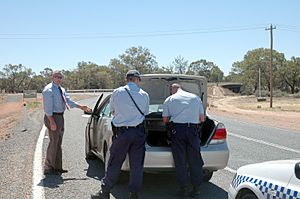Search and seizure facts for kids

Search and seizure is when police or other law enforcement officials look for and take evidence of a crime. This action is allowed by law. They usually need a special document called a search warrant to do this. A search warrant is a paper signed by a judge that gives permission to search a specific place and take certain items.
Contents
What is Search and Seizure?
Search and seizure means that police can look through your property and take things they find. This is done to gather evidence for a legal case. The "search" part is when they look for items. The "seizure" part is when they take those items.
Why Do Police Search?
Police search to find things that can prove a crime happened. For example, they might look for stolen items, tools used in a crime, or documents. The goal is to collect evidence that can be used in court.
What is a Search Warrant?
A search warrant is a very important legal paper. It is issued by a judge. This paper gives police permission to search a specific place. It also lists what they are allowed to look for and take.
When is a Warrant Needed?
Usually, police need a search warrant before they can search someone's home or property. This rule helps protect people's privacy. A judge will only issue a warrant if police can show they have a good reason to believe evidence of a crime is in that place. This is called "probable cause."
Exceptions to the Warrant Rule
Sometimes, police can search without a warrant. These are special situations, such as:
- Consent: If a person agrees to let the police search.
- Emergency: If there's an immediate danger, like someone's life is at risk.
- Plain View: If evidence of a crime is clearly visible to an officer. For example, if an illegal item is sitting on a car seat and an officer sees it from outside the car.
- Search Incident to Arrest: If someone is arrested, police can search the area around them for weapons or evidence that might be destroyed.
- Vehicles: Police can sometimes search a vehicle without a warrant if they have probable cause to believe it contains evidence of a crime. This is because vehicles can be moved quickly.
Your Rights During a Search
In many countries, like the United States, people have rights that protect them from unfair searches. These rights are often part of the country's constitution. For example, the Fourth Amendment in the U.S. Constitution protects people from "unreasonable searches and seizures."
What if Police Don't Have a Warrant?
If police try to search your home without a warrant, you can politely say no. You have the right to refuse a search if they don't have a warrant or a valid reason for an exception. However, if they have a warrant, you must let them search.
What Happens to Seized Items?
If police seize items, they usually keep them as evidence. These items might be shown in court during a trial. If the items are not needed for evidence, they might be returned to their owner later.
History of Search and Seizure Laws
The idea of protecting people from unfair searches goes back a long way. In England, before the United States was formed, the government sometimes used "general warrants" to search anywhere they wanted. This led to many problems and was seen as unfair.
When the United States was created, the founders wanted to make sure this didn't happen again. That's why they included the Fourth Amendment in the Bill of Rights. This amendment made it clear that searches must be reasonable and usually require a specific warrant.
See also
 In Spanish: Allanamiento para niños
In Spanish: Allanamiento para niños
 | George Robert Carruthers |
 | Patricia Bath |
 | Jan Ernst Matzeliger |
 | Alexander Miles |

